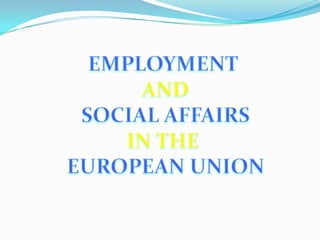
European union
- 2. European society is changing, influenced by different factors such as technological progress, the globalisation of trade and an ageing population. European employment, social affairs and equal opportunities policies contribute to improving people’s living conditions with a view to sustainable growth and greater social cohesion. The European Union (EU) plays the role of a trigger in social change. It has introduced a protective legal framework for European citizens. It fosters the cooperation of Member States, the coordination and harmonisation of national policies, and the participation of local authorities, unions, employers’ organisations and other stakeholders involved. The priority aims of this policy are to increase employment and worker mobility, to improve the quality of jobs and, working conditions, to inform and consult workers, to combat poverty and social exclusion, to promote equality between men and women, and to modernise social protection systems
- 3. Social and employment situation in europe Statistical data which can be compared at European level are essential for the monitoring of social and labour market developments in the European Union. They are used in particular to assess the impact of economic and demographic changes on the labour market. In this respect, the Commission has set up systems for collecting statistical information used to establish performance indicators. It also supports the analysis work undertaken by the Member States through the Community Programme for Employment and Solidarity, and the work of the European Employment Observatory. All this information is recorded in annual reports.
- 4. For the EU to emerge from the economic crisis, preventing rising unemployment from becoming entrenched is a priority. In addition, the EU is facing an ageing workforce and increased international competition. Structural reforms are therefore needed to improve labour market flexibility, secure the availability of a skilled workforce ?including through economic migration and put in place modern social policies. The aim must be to have more people in work, working more productively. Flexicurity should be at the heart of the European employment strategy and the leading principle in the development of social policy. Employment, social and immigration policies must be adapted to the diversity of situations in the Member States.
- 5. BUSINESSEUROPE is actively engaged in the European social dialogue in order to find solutions reconciling economic and social needs of labour market players, and to devise concrete arrangements that benefit both companies and employees
- 6. List of commissioners Name Country Period Commission 1 Lionello Levi Sandri Italy 1967–1970 Rey Commission Malfatti Commission, 2 Albert Coppé Belgium 1970–1973 Mansholt Commission 3 Patrick Hillery Ireland 1973–1977 Ortoli Commission 4 Henk Vredeling Netherlands 1977–1981 Jenkins Commission 5 Ivor Richard United Kingdom 1981–1985 Thorn Commission 6 Peter Sutherland Ireland 1985–1989 Delors Commission I 7 Vasso Papandreou Greece 1989–1992 Delors Commission II Delors Commission III, Santer 8 Pádraig Flynn Ireland 1993–1999 Commission, Marín Commission 9 Anna Diamantopoulou Greece 1999–2004 Prodi Commission 10 Vladimír Špidla Czech Republic 2004–2010 Barroso Commission I 11 László Andor Hungary 2010 onwards Barroso Commission II
- 7. Social protection From a worldwide perspective, the European Union (EU) is clearly a model of social protection. Unemployment, poor health, invalidity, family situations and old age are some of the risks which these systems were created to deal with. The systems also guarantee access to several services that are vital to the preservation of human dignity. Although the Member States are responsible for organising and funding social protection systems, the EU has a special role to play by introducing legislation which coordinates the national social security systems, particularly with regard to mobility within the Community. The EU recently committed itself to promoting closer cooperation between the Member States in modernising their social protection systems, which face similar challenges throughout the EU.
- 8. Employment rights and work organisation The European Union has minimum requirements in the field of labour rights and work organisation. These requirements concern collective redundancies, insolvency and the transfer of undertakings, the consultation and information of workers, working hours, equal treatment and pay, and posted workers. They have been supplemented by framework agreements between the European social partners. This has led to the introduction throughout the EU of the right to parental leave and leave for family reasons, and has facilitated part-time work and limited the use of successive fixed-term contracts. Lastly, the concept of corporate social responsability encourages businesses to adopt good practices in the social field on a voluntary basis. The European Foundation for the Improvement of Living and Working Conditions makes recommendations to the political decision- makers.
- 9. Social dialogue and employee participation Dialogue with the social partners constitutes one of the pillars of the European social model. Firmly anchored in the Treaty establishing the European Community, it embraces discussions, consultations, negotiations and joint actions involving the representative social partner organisations. The European social dialogue, which can be bipartite or tripartite, supplements the national social dialogue arrangements which exist in most Member States. Based on the principles of solidarity, responsibility and participation, it constitutes the main channel through which the social partners contribute to the establishing of European social standards and play a vital role in the governance of the Union.
- 10. Community employment policies The European Union’s work contributes to reducing rates of unemployment and improving the quality of jobs, in particular through the Lisbon Strategy for growth and jobs. In the context of the international financial crisis, additional measures have been taken to protect existing jobs and to create new opportunities. Each year, more than EUR 10 billion are invested through the European Social Fund (ESF) to improve job prospects for the population. Projects, co-financed by Member States, support companies in adapting to developments in the economic and social situation. They promote access to lifelong learning and training in order to develop workers’ skills.